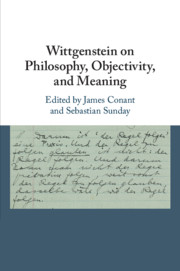Book contents
- Wittgenstein on Philosophy, Objectivity, and Meaning
- Wittgenstein on Philosophy, Objectivity, and Meaning
- Copyright page
- Contents
- Contributors
- Preface
- Acknowledgments
- Chapter 1 Anatomy of a Muddle: Wittgenstein and Philosophy
- Chapter 2 Explaining What We Mean
- Chapter 3 Objectivity
- Chapter 4 The Methodological Significance of Intuitions in Philosophy
- Chapter 5 Wittgenstein on ‘Seeing Meanings’
- Chapter 6 Bringing the Phenomenal World into View
- Chapter 7 First Steps and Conceptual Creativity
- Chapter 8 Wittgenstein and Analytic Revisionism
- Chapter 9 Demystifying Meaning in Horwich and Wittgenstein
- Chapter 10 What Is Meaning? A Wittgensteinian Answer to an Un-Wittgensteinian Question
- Chapter 11 Meaning, Use, and Supervenience
- Chapter 12 Some Socratic Aspects of Wittgenstein’s Conception of Philosophy
- References
- Index
Chapter 9 - Demystifying Meaning in Horwich and Wittgenstein
Published online by Cambridge University Press: 15 August 2019
- Wittgenstein on Philosophy, Objectivity, and Meaning
- Wittgenstein on Philosophy, Objectivity, and Meaning
- Copyright page
- Contents
- Contributors
- Preface
- Acknowledgments
- Chapter 1 Anatomy of a Muddle: Wittgenstein and Philosophy
- Chapter 2 Explaining What We Mean
- Chapter 3 Objectivity
- Chapter 4 The Methodological Significance of Intuitions in Philosophy
- Chapter 5 Wittgenstein on ‘Seeing Meanings’
- Chapter 6 Bringing the Phenomenal World into View
- Chapter 7 First Steps and Conceptual Creativity
- Chapter 8 Wittgenstein and Analytic Revisionism
- Chapter 9 Demystifying Meaning in Horwich and Wittgenstein
- Chapter 10 What Is Meaning? A Wittgensteinian Answer to an Un-Wittgensteinian Question
- Chapter 11 Meaning, Use, and Supervenience
- Chapter 12 Some Socratic Aspects of Wittgenstein’s Conception of Philosophy
- References
- Index
Summary
Paul Horwich has advocated, and attributed to the later Wittgenstein, a “use-theory of meaning” that aims to demystify meaning by reducing it to pure regularities of use. This chapter challenges Horwich’s appropriation of Wittgenstein and seeks to make room for a different conception of the demystification of meaning. It argues that Wittgenstein does indeed aim to demystify meaning, but does not think that this involves any attempt to reduce meaning to something else.
Keywords
Information
- Type
- Chapter
- Information
- Wittgenstein on Philosophy, Objectivity, and Meaning , pp. 164 - 184Publisher: Cambridge University PressPrint publication year: 2019
